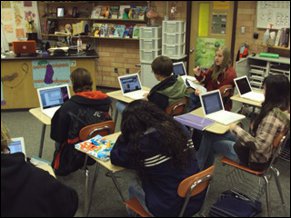1:1 Laptop Programs: Shifting the Way Students Learn
Your content has been saved!
Go to My Saved Content.I usually join the 5 p.m. MST #edchat on Twitter, but this past Tuesday (January 19), my colleague @boundstaffpress (Justin Miller) mentioned that I should tune in to the early version of #edchat.
The topic, laptops in the classroom, was one I follow carefully, because I run a science classroom with MacBooks for each student. So I multitasked while teaching and joined some of the #edchat discussion of whether 1:1 laptop programs are the future of education and exactly how such programs are changing education.
One of the main questions at the beginning of #edchat was related to which types of hardware schools choose and whether students get to take them home:
@RonnieGonzalez Does every student need a laptop to take home, or just a desktop in their class? Instead of labs, every classroom with a thin client.
Many hardware choices exist, but for my classroom, I chose to use MacBooks. These laptops are powerful enough to do most any task that desktops can do, but students could use them in my room at their desks without having to travel to a computer lab.
Students use my class set of MacBooks at school but not at home, although I have checked them out for special projects. Students have the ability to personalize their laptop experience, however, and they refer to them as "their" laptops.
Another of the major #edchat concerns was about student misuse:
@seanbanville Big danger is students chatting, surfing, gaming, etc., instead of studying.
@lhiltbr Classroom management is also a huge piece. Make sure students know expected routines/procedures/uses of the tools.

Students do use the computers for a variety of tasks, most of which, but not all, are directly related to classroom learning tasks. I have no problem with students checking their English class ning or reading articles in Forbes as long as they are on track with my content.
I know that they are on these sites because I use Apple's Remote Desktop to monitor student use of the laptops. I can lock all screens if uninterrupted discussion is necessary or chat privately with a student who is off task or needs help with an assignment.
Probably the biggest area of concern on #edchat was how 1:1 laptops in class would change the role of the teacher and whether teachers could handle the change:
@cybraryman Laptops are wonderful, but teacher needs to know how to incorporate the tech & when and how to use it first.
@evmaiden Teachers won't be replaced by technology, but teachers who don't use tech will be replaced by teachers who do.
My style of teaching and assessment of students has changed dramatically now that everyone has a laptop in class. For example, I now use Edmodo to share assignment files and information with students. This extends my contact time with students who ask questions and turn in assignments anytime or anywhere because my courses are now effectively online.
Assessment of students can be altered, too, since it is possible to deliver flexible student assessments online using my Moodle site. And, most importantly, each student now has the tools to create digital content that shows their level of understanding of a topic.
A class set of laptops has definitely changed how my classes operate. The most exciting change is the spontaneity and interactivity that laptops bring to classroom discussions.
I still lecture at times, but students now have instant access to information besides what I offer, so, if a student finds a relevant example from a reading or a video, they can share that with the whole class. Not only that, but students I have taught in past years who never took notes during lectures are now consistently taking notes using their laptops.
In summary, I think that students with laptops in class are more likely to contribute to class discussions and are able to engage course content in more meaningful ways. So, even though schools like mine aren't yet true 1:1, even a class set of laptops can lead to a major shift in the way students learn.
Check out the rest of the #edchat transcript here. If you have never participated in an #edchat conversation, please join us on Twitter every Tuesday at 12 p.m. EST/6 p.m. CET or at 7 p.m. EST/1 a.m. CET.
Chris Ludwig teaches chemistry, biology, AP Biology, and Anatomy and Physiology at La Junta High School, on the eastern plains of Colorado. He graduated with honors from the University of Arizona with a bachelor's degree in molecular and cellular biology in 1993. He then pursued a doctorate in neuroscience at Washington University, in St. Louis, won a National Science Foundation Predoctoral Fellowship in 1994, and left the neuroscience program with a master's degree in 1999 to take his love of science back to the community through teaching. Read more.